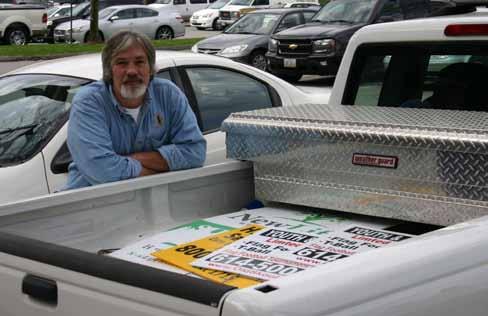
2 minute read
Safe, Clean Neighborhoods Are the Mission of Code
Staff Profile: Skip Kraft, Code Enforcement Officer
yard sale signs are not permitted in the right-of-way.
What’s one of the most common misconceptions about code enforcement in the City?
The folks we visit typically are not pleased to see us, but we are out there ultimately to help them and their neighborhood. The City of Westerville has made a commitment to have safe and clean neighborhoods, and this is part of that process. We work to be as reasonable as possible, and will help when we can to resolve an issue. For the neighborhoods’ benefit, our focus is on compliance before enforcement.
Skip Kraft started his career in law enforcement. After working as a police officer in Lancaster, Ohio, he retired and picked up another enforcement profession. Now one of two code enforcement officers in the City of Westerville Zoning Division, Skip works with residents on property compliance issues to ensure safe, clean and friendly neighborhoods throughout the community.
Where are you from?
I was born in Philadelphia, where my dad was stationed in the Navy. We moved to Lancaster when I was 6 months old. I’ve lived in Ohio since that time.
How long have you been working in code enforcement?
I’ve spent nearly 14 years in code enforcement. I first started this part of my career as a housing rehabilitation specialist at the Fairfield County Regional Planning Commission. We utilized grant funding to inspect housing and make improvements for low-income families. I was also the Assistant Flood Plain Manager for the County.
How long have you worked for the City?
I started in Westerville in 2003, so I am nearing 10 years. Since I had a back- ground in law enforcement, I heard about the opportunity from a police officer. What are the most common code violations and complaints in Westerville?
Most often, we get complaints about tall grass. When the weather turns warm, most lawns in Westerville are regularly mowed. The problem comes into play when grass and weeds become noticeably overgrown in a yard. But the grass has to be eight inches or higher before we can leave notice, and the weeds have to fall into the category of “noxious weeds.” It’s a common misconception that overgrown dandelions are a violation, but they are not a noxious weed. Westerville’s code lists thistle, burdock, jimson weed, ragweed, milkweed, mullein and poison ivy, among others, as noxious. If you have questions, the best thing to do is Google “noxious weeds” and find a listing, like the USDA plant website, that shows noxious weed categories by state. You can also see images from those websites.
We also remove a lot of signs from the right-of-way in a given week. Sales signs or signs for commercial offers are not permitted in the City. Garage and
What are property maintenance tasks that people can take care of this spring to avoid issues?
Common things, or a get-started list, may include things like exterior work on a house. Chipping paint, for instance, is something that can happen from season to season and needs to be addressed before the exterior deteriorates. Picking up trash or debris is something you can do without any major investment. Also, picking up after your animals is important. If you’re not keeping up with them in your yard, the stench can be upsetting to neighbors.
Are there resources for residents who may need help?
If someone is having trouble with home maintenance or other issues for legitimate reasons – like age, disability or financial difficulties due to the loss of a job – there are organizations out there that offer services or volunteers. Check into programs that your church may offer. If a resident receives a violation and needs help, we may be able to connect that person to resources in the community.
If a resident is concerned about a violation, how should they report it?










